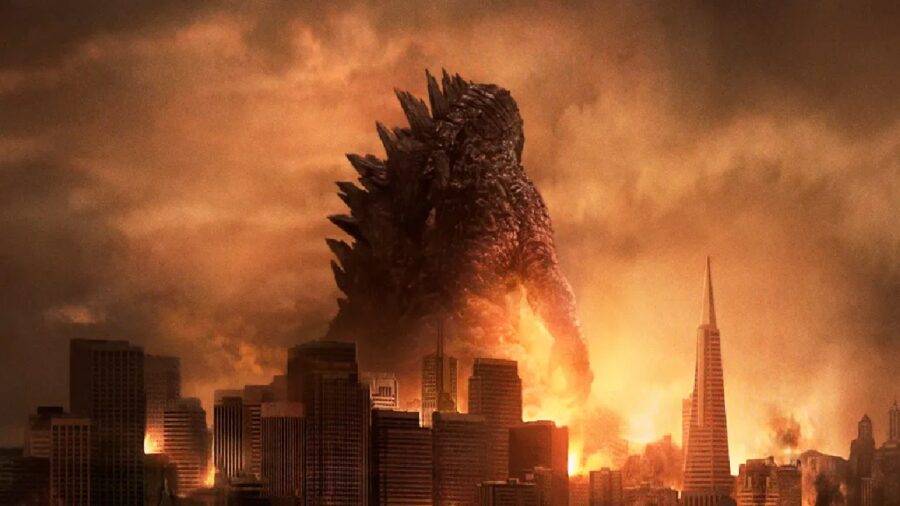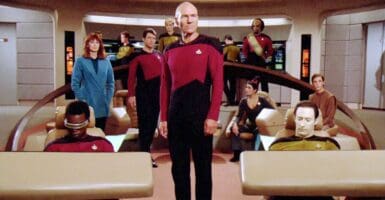Godzilla: A Movie Discussion

So, after what seemed like forever, director Gareth Edwards’ Godzilla reboot finally arrived in 2014, and we enjoyed it thoroughly. We had been writing about this extensively during the build-up, and reviewed the movie before it came out. But that was not nearly enough for a film of this magnitude.
So Nick and Brent sat down and traded thoughts. Don’t worry—we left out the really inappropriate stuff.
Brent: I loved this movie, a lot, and I know you really enjoyed it, too, but one thing that really surprised me throughout the weekend is the hate. Many people feel the way we do, but I’ve encountered more people than I expected, both critics and fans, who are totally mad at this movie. I understand that I do not like it, but there is some intense hatred for a variety of reasons. Even more so than a movie like Pacific Rim, which also totally divided people.
Nick: Here’s my stance against the “They didn’t show Godzilla enough” argument. This is essentially an origin story, and origin stories tend not to deliver the “hero” right away, letting the anticipation build until the third act’s major sequences. It’s set up exactly the same here, but for some reason people were expecting Godzilla to just be front and center without explanation.
Spending a good chunk of time just watching him destroy things and chasing the other monsters could have been spiced up, but there’s no way a Hollywood movie with this kind of budget would just allow its biggest character to start the film off stomping apartment buildings. They think people are too dumb for that. Would it have been awesome? Yes. But was it expected? Not in the least.
Brent: A huge part of the movie’s tension is the buildup until we actually see Godzilla. They didn’t wait as long as I expected them to. In a movie like this, if you show the creature right away, you immediately show your hand. Part of what Edwards does well here is that you expect the first monster you see to be the main attraction. There’s so much history here, so much familiarity with Godzilla, that when it turns out to be MUTO that hatches at the nuclear plant site, it’s very much a misdirection move.
Nick: Agreed, but really only for Godzilla fans. That expectation wouldn’t be there if this were an unrelated monster movie. I really want to see it with my wife, who has never seen any of the films to my knowledge, though it’s impossible for her not to know the legacy. I kept trying to think of it as a completely different movie from everything I knew about Godzilla.
Brent: That’s hard to do. Godzilla is one of those pieces of pop culture that is so ubiquitous that even people who have never seen an actual movie still know who and what he is.
Nick: Yeah. So it’s better that they got into the MUTOs first, to me, because they were the strangers that nobody knew much about. Now, using new monsters rather than appealing to the fan desire to see recognizable villains is a different issue.
Brent: I kind of liked a balance of old and new. Right from the opening credits, with all that redacted stuff and the newsreel footage, they tap into the more than half a century of history this franchise brings. And that’s another thing that I think Edwards and company do well, keeping the old and fitting the story into the existing framework while trying to put their own stamp on it.
In order to satisfy fans, especially after Roland Emmerich’s 1998 version, Godzilla has to look and feel a certain way. Still, the new creatures allow them to do something completely their own. Even if they do look a little like the bugs from Starship Troopers.
Nick: That opening credits sequence was redactedly amazing. I’m actually really glad to have read the prequel graphic novel first because it gave me an even greater sense of the history behind this revised version of the story screenwriter Max Borenstein (and several rewriters) were telling.
The movie does an okay job of driving home the fact that these are ancient creatures, but the comic lays that out a little better. And it makes the use of nuclear weapons in the 1950s all the more frightening and stupid when it’s given the oomph of, “You’ve awoken the beasts, humanity! It’s all your fault!”
Brent: That was one aspect that left me wanting in the movie. The original Godzilla was such a cautionary tale about moving into the atomic age, but this one never had that deeper thematic level. They’re like, here are some giant monsters that just woke up and started wrecking up the joint.
Nick: So that is kind of a cautionary tale in and of itself, even without anyone blatantly stating, “We sure are probably fucking up by using more radiation; it just makes them hungry.” Though somebody does say something like that, only to be waved away with the “force of the bomb” spiel.
Brent: True, but to me, that felt like a part of the flustered, bumbling reaction people had, like, we don’t know what to do, we’re out of options, so let’s nuke the fucker. This actually feels like a natural response to a giant monster, a bunch of people with no clue how to proceed running around with their finger on the button.
Brent: For me, the human component of the story is easily the biggest weakness in Godzilla. I didn’t need any more from them other than to be there to react to the monsters, but given the caliber of the cast, I was hoping for something more substantial on that front. When you have actors like Bryan Cranston, Juliette Binoche, Elizabeth Olsen, Ken Watanabe, and more, watching them be totally underused is a bummer.
Nick: I loved Cranston, as I knew I would. He almost went over the top, but managed to anchor it with his subtle acceptance that he knows he’s viewed as a crackpot. The biggest emotional moment that didn’t involve cheering was Joe standing at the door, watching Binoche as she helplessly kept saying that she couldn’t get out.
That dread was something that I’d never felt in any other Godzilla story. This doesn’t lift Ford Brody’s role in the story any higher, but it was nice to begin the film with something relatable and some heart so that it could transition into a human-less disaster story by the end.
That said, why the hell wasn’t Elizabeth Olsen the main character? She can do more with those big, gorgeous eyes than Taylor-Johnson can do with his whole body. Or at least what we can see of it in Godzilla. Even if her dialogue was crap, she would have been a much more compelling lead, and Ford could have still had a smaller military-based storyline.
Brent: I would have loved to see that. At least Cranston and Taylor-Johnson get screen time. Olsen is totally underutilized. And why the hell was Sally Hawkins even in this movie? All she did was follow Ken Watanabe around. Those two are fantastic, and the film does nothing with either of them except for that sweet “Let them fight” line.
Nick: Sci-fi loves to make its Asian characters just stand there, knowing things that they aren’t telling anyone else. With Sally Hawkins nearby.
Brent: He’s like Godzilla’s version of the wise old janitor in a John Hughes movie. He just knows things that he has no business knowing. With Sally Hawkins nearby.
Nick: Again, the comic does a good job of digging into his backstory, which involved his father being one of the original people studying Godzilla’s patterns. Basically what Cranston does, only with concrete knowledge of the monster’s existence. But here he’s just the guy who people can look at and think, “Godzilla is from Japan.”
Brent: I knew there must be more to his story. There were reports that Akira Takarada, one of the stars from the original, was going to make a cameo, and I always suspected that he was going to be someone who experienced Godzilla back in 1954 and who would shed some light on the proceedings, but you never get any of that. Serizawa (Watanabe) just seems to know that Godzilla is trying to restore balance to nature instead of nothing.
Nick: They totally play up the Godzilla saving humanity concept. I don’t know why that part of the story was avoided so heavily here. It would have made a ton of sense. Almost more unbelievable than giant monsters was the fact that more people weren’t just saying, “Nuke it.”
Once Watanabe’s Dr. Serizawa started saying things like “restoring balance,” people would have immediately dismissed him and sent him away. But I guess he has really good eyesight, since he pegged the stretcher-bound Bryan Cranston from a fucking mile away before that helicopter ride. Maybe he can see things no one else can.
Brent: I thoroughly approve of the Godzilla design. He’s big, green, and looks like the bastard child of a dinosaur and Baby Huey. And even though he’s this massive primordial monster, he still kind of looks like a guy running around in a rubber suit, which we can all appreciate.
Nick: He actually had heft and weight. And he wasn’t just a mastermind of MUTO murder. It is kind of silly to just rise from the depths in order to take on a nearly impossible fight, but I trust Godzilla’s sense of duty.
Brent: They definitely went out of their way to make him a hero and give him a job. I couldn’t help but think about what he does when he’s not fighting monsters that pop up every once in a while. Does he have any hobbies?
Nick: I seriously loved the fight scenes and wish there were more of them. I don’t get why he didn’t just burn everything, but I was ecstatic every time Edwards pulled the camera back and showed the wide-scale shots of everybody going to town on each other. It was very Rampage. I could have used more of that helicopter-view stuff, too.
Brent: One thing I appreciate is the way they film the monsters. It was always from a human perspective, even from the helicopters. Edwards really places you right in the middle and makes you feel like you’re there watching this go down. It gives you more of a personal stake in the action.
Nick: Plus, I loved that the MUTOs had their own story of survival, that it was actually depressing when that one saw that all of her babies died and that Edwards and Co. kept the enemies limited to two. The monsters were better developed than the humans. Definitely.
They had a purpose and really weren’t all that malevolent when you consider they probably don’t understand what humans are. Godzilla had a mission, and the MUTOs were just acting on their natural instinct. They were destructive, but, not evil.
And I think that a really strong part of the untold story lies in that. This is mankind given a huge threat that doesn’t involve politics or religion or anything or any of the usual stuff. It’s just mass destruction, and we’re left assuming that humanity is still supposed to be the kings of the planet when we obviously aren’t. There are no bad guys to get mad at. Only survival to strive for.
Brent: This is really just the story of how two star-crossed monsters have their blossoming romance ruined by a giant dinosaur and some dicks with nuclear weapons. There’s a serious Romeo and Juliet vibe to that side of the story. Someone needs to make that movie.
Nick: Honestly, for all that the human part of the story was bland, the fact that MUTOs made out totally made up for it. It’s totally bonkers in a way that doesn’t even seem bonkers at all.
Brent: And for a second, you’re like, oh, that’s kind of cute. It’s part of the way the film humanizes the monsters. Like when Godzilla collapses at the end, exhausted, right in front of Ford, and there’s a kind of “good job, bro” moment between them. They did a better job making you care about the creatures than the actual people in a lot of ways. They were at least much more interesting story-wise.
In a lot of ways Godzilla is more of a natural disaster movie than it is a creature feature. The monsters are almost the equivalent of an earthquake or a tsunami, both of which actually happen in the movie.
Nick: Yeah. I’d also point out that the tone managed to stay depressing and dour but still retained excitement through the action. All Edwards.
Brent: Yeah, it’s very bleak. What about the mass destruction and all? That never weighs it down. And in the end, it doesn’t dwell on the mass chaos the monsters created, it’s more of a celebration of surviving, of living through this. It was very heroic for a monster movie. No human heroes here.












